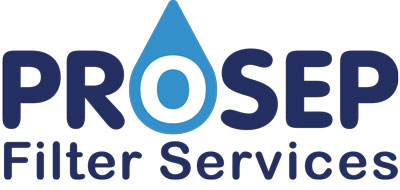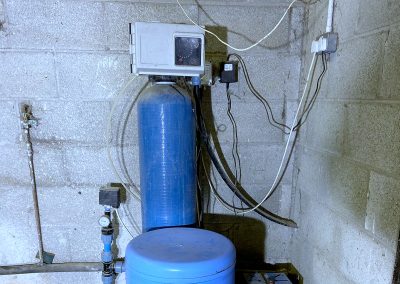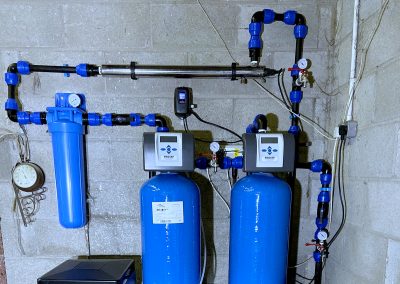Location:
Peak District, Derbyshire
The Challenge
This borehole filtration upgrade took place at a new customer’s property in the stunning Peak District. When the house was purchased, it came with an existing but non-functioning water treatment system that failed to provide safe drinking water. Our expert team removed the old system and installed a state-of-the-art, brand-new solution to ensure clean and safe drinking water for both the property owner and their holiday let guests.
The Solution
Our comprehensive system features a top-of-the-line sediment filtration unit capable of removing even the tiniest particles as small as 5um. Equipped with an auto backwashing head, this filter ensures hassle-free cleaning and maintenance. Additionally, we’ve added an advanced Ion Exchange vessel to effectively eliminate iron, manganese, and hardness present in the raw water. As a final touch, a 20” cartridge filter guarantees that no fine particulates can pass through the UV disinfection process.
Additional Details
We were able to save our customer some money by reusing the existing UV system on-site. After replacing the quartz and bulb, the UV unit was reinstalled. For added peace of mind, we installed an auto shut off system on the UV unit, ensuring that untreated water won’t flow into the house or holiday let should the UV light fail for any reason.
Useful Information
What is hard water and is it really a concern?
Hard water is characterized by its high mineral content, which occurs when water passes through limestone and chalk. This natural process is prevalent throughout the country. While hard drinking water may offer some health benefits, it can pose challenges over time. Mineral deposits, known as limescale, tend to accumulate on kettles, water heaters, and other appliances, causing potential issues, especially in industrial settings. One telltale sign of hard water is when soap doesn’t lather as well as in soft water areas. To mitigate these effects, water softening techniques are employed.
Now, let’s touch upon another aspect – manganese. Why is this mineral a cause for concern? In small amounts, manganese is an essential nutrient. However, excessive levels can lead to severe health problems, including toxicity on the nervous system and symptoms resembling Parkinson’s disease. This is particularly true for vulnerable groups such as children, the elderly, and expectant mothers.
Next, let’s consider the impact of iron in your water supply. Over time, iron can cause discoloration and affect the quality of your laundry and crockery. The water may taste metallic and even leave traces in your coffee, tea, and other beverages. Additionally, food prepared with iron-contaminated water might darken and absorb a metallic flavor. With these insights, it’s crucial to understand the implications of hard water and the presence of manganese and iron in your water source.


